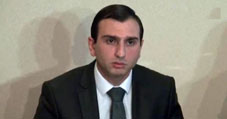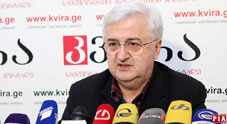
Another version of Kardziani’s murder
By Tatia Megeneishvili
Friday, April 24
A son of a gunned-down businessman, Besik Khardziani, accuses his father’s second wife, Eka Nonikashvili, of ordering the murder.
Mikheil Khardziani claims that his life, and those of his family, are at risk, as Nonikashvili intends to grab the whole property of his father.
“My aunt Maia Khardziani and my grandmother advised us to stay quiet. They told me that we might also be killed if we raise some objections over ownership of the property.
“My aunt must speak before cameras and tell everything she knows about Nonikashvili. The silence brings the investigation down a blind alley,” he says.
Khardziani’s son stresses that he has grounds to think that Nonikashvili ordered his father’s murder.
“Now she claims that the murder was an ordered hit and is pointing a finger to the United National Movement (UNM) member Giorgi Udesiani, while she lives in the house and drives a car gifted by Udesiani. Also, I think that when my father was detained under the UNM government, it was arranged by Nonikashvili in order to appropriate my father’s wealth,” stated Khardzinai.
Meanwhile, Khardziani’s family barrister Malkhaz Salakaia dismissed the accusations and stressed that the blame voiced by M. Khardziani was immoral.
“The family is shocked how one can have such strange thoughts and shift blame onto his own family,” stated Salakaia.
Khardziani, who was actively campaigning against the current opposition United National Movement was shot dead at his flat on March 29.
An unidentified individual on a motorbike shot him three times. The last shot to the head turned out to be fatal. His wife, who was standing at the balcony that time, witnessed the crime.
Khardzinai was detained in 2011 under the UNM government for drug-related crimes. However, Khardziani stated that his arrest was because of his refusal to hand his Turtle Lake shares to Udesiani.
Khardziani spent nearly two years in prison and stated he had experienced inhumane treatment there. He was released through the large-scale amnesty carried out by the Georgian Dream government.
When released, Khardziani sued the former authorities and was struggling to regain his property.


